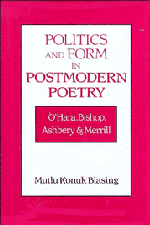Book contents
- Frontmatter
- Contents
- Acknowledgments
- Introduction: Poetry after Modernism
- Frank O'Hara: “How Am I to Become a Legend?”
- Elizabeth Bishop: “Repeat, Repeat, Repeat; Revise, Revise, Revise”
- John Ashbery: “The Epidemic of the Way We Live Now”
- James Merrill: “Sour Windfalls of the Orchard Back of Us”
- Notes
- Works Cited
- Index
- CAMBRIDGE STUDIES IN AMERICAN LITERATURE AND CULTURE
Elizabeth Bishop: “Repeat, Repeat, Repeat; Revise, Revise, Revise”
Published online by Cambridge University Press: 12 March 2010
- Frontmatter
- Contents
- Acknowledgments
- Introduction: Poetry after Modernism
- Frank O'Hara: “How Am I to Become a Legend?”
- Elizabeth Bishop: “Repeat, Repeat, Repeat; Revise, Revise, Revise”
- John Ashbery: “The Epidemic of the Way We Live Now”
- James Merrill: “Sour Windfalls of the Orchard Back of Us”
- Notes
- Works Cited
- Index
- CAMBRIDGE STUDIES IN AMERICAN LITERATURE AND CULTURE
Summary
Costume and custom are complex.
The headgear of the other sex
inspires us to experiment.
Bishop (1983: 200)Elizabeth Bishop's refusal to be classified and anthologized as a woman poet is well known; less well known, perhaps, is her statement “I've always considered myself a strong feminist” (1981: 80). Taken together, these positions suggest that her being a “feminist” – whatever she may mean by it, she is not evading the political issue – does not entail her perceiving her work as a woman poet's, and she demands to be read from this double perspective. For in order to read Bishop as a feminist, we need to place her all the more firmly within a patriarchal tradition so as to see how her revisions of it signify politically as well as poetically. Formally, her work is traditional: her lines are usually metrical, her stanzas often have intricate rhyme schemes, and her forms range from blank verse and sonnets to sestinas and villanelles. Her conventional stanzas and meters, together with her grammatical syntax, place her within the symbolic order, and while she challenges its assumptions and hierarchies, her dissensions– including “feminist” revisions – register within this framework. However, given her his- torical position after modernism, her conventional forms and language themselves serve a critical function: by aligning herself with a patriarchal tradition and observing conventional verse forms, she can critique a different – and, from her position, more dangerous because more naturalized– set of assumptions that underwrite the investment of authority in the person and experience of the poet, who is historically male.
- Type
- Chapter
- Information
- Politics and Form in Postmodern PoetryO'Hara, Bishop, Ashbery, and Merrill, pp. 67 - 109Publisher: Cambridge University PressPrint publication year: 1995



